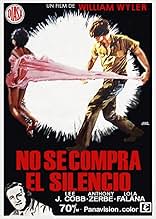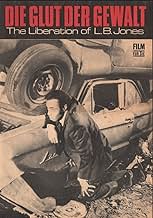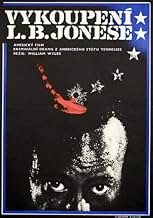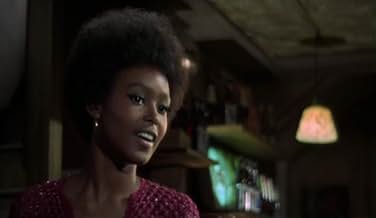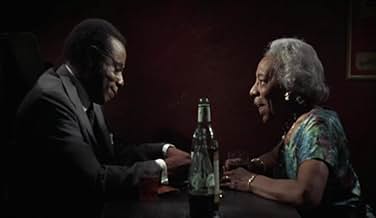AVALIAÇÃO DA IMDb
6,8/10
1,3 mil
SUA AVALIAÇÃO
Adicionar um enredo no seu idiomaA successful African American businessman has a quarrel with a white policeman, suspecting that he is having an affair with his wife. The policeman's colleagues are seeking to avoid publicit... Ler tudoA successful African American businessman has a quarrel with a white policeman, suspecting that he is having an affair with his wife. The policeman's colleagues are seeking to avoid publicity.A successful African American businessman has a quarrel with a white policeman, suspecting that he is having an affair with his wife. The policeman's colleagues are seeking to avoid publicity.
- Direção
- Roteiristas
- Artistas
- Prêmios
- 1 indicação no total
Joseph Attles
- Henry
- (as Joe Attles)
Avaliações em destaque
The "novel" this is based on was according to the author, almost entirely true, only the names were changed to protect the innocent and the guilty. This underlying truth plays out strongly here. I must stop to say the plot synopsis has nothing to do with the film. This is not a mystery with a "who did it" structure and it is not a courtroom justice or injustice movie. The events play out in sequence and we jump from character to character so that it remains, every bodies story, so to speak. We aren't allowed to distance ourselves from the story by taking the look from the good lawyer or cops perspective after the fact. Yaphet Kotto among many, probably gives the best performance. The photography and the score both seem a bit dated, though each have their strong moments, otherwise this doesn't date at all. The characters motives, good and bad, are clearly laid out and well performed. There are a few moments of technical slop, some optical blow ups of shots in the middle of dialog scenes and a couple of lazy zooms that would not have appeared in a Wyler film a few years before that, but in every other way this shows him still at the top of his game. It's a shame that he stopped making films after this. He himself considered it a strong film and he seems to have more or less expected that it would anger people (white ones that is) when it was released. His usual skill with actors is in evidence and there is some interesting use of sound to help tell the story at crucial moments. Very powerful stuff all around.
The Liberation of L. B. Jones (1970) is currently available on Tubi. The storyline involves a black couple going through a divorce when the man discovers his wife is cheating on him with a local white police officer. When the woman hires a lawyer and threatens to fight the divorce, the police officer is informed the nature of their relationship may become public. Since white and black people sleeping together is heavily frowned upon the police officer could lose his job. He quickly goes on a rampage beating his lover and trying to hide the nature of their relationship by any means necessary. This movie is directed by William Wyler (Ben-Hur) and stars Lee J. Cobb (12 Angry Men), Lola Falana (The Klansman), Lee Majors (The Six Million Dollar Man), Roscoe Lee Browne (Logan's Run) and Yaphet Kotto (Alien). The storyline for this is very well told and portrayed. The ex-husband's patience was absolutely unbelievable, but so was his wife's ruthlesness. This movie in some ways gave me divorce PTSD. I loved the character interactions across the board and the set-up by the ruthless and dirty police officers was good, which makes the ending even more enjoyable. Overall this is a smart movie with a well told storyline I would strongly recommend seeing. I'd score this a solid 7.5/10.
William Wyler had such a diverse and non-stereotypical career. He painted on a grand canvas with "Ben-Hur," "Funny Girl," and "The Big Country," romped about with fluff on "Roman Holiday" and "How To Steal A Million," and reined in on tight dramas like "Jezebel," "Detective Story," and "The Collector", all to name but a few. "The Liberation of L.B. Jones" was his last film, and its message is still powerful and taut. Here, Wyler reins in very tightly on a drama, placing his camera stock still in three-walled sets and allows the intensity to grow from the individuals coming undone within its frame.
Hollywood was just turning the corner in its presentation of dramatic material around 1970, with the revolutionary "The Graduate," "Bonnie & Clyde", and "Midnight Cowboy" already released, so Wyler's effort appears rooted to an earlier period in its presentation. Elmer Bernstein's music is bombastic and overly showy. The confining studios sets scream of the backlot environment "daring" pictures were then moving away from. And Wyler's static camera technique is a far cry from the fluid shots used by up 'n coming directors Penn, Nichols, Friedkin, and Wexler. But the overall tone and downbeat ending of "Jones" foreshadowed the de rigueur hard-edged storytelling that would make '70s pictures so vibrant.
Taking place in some jerkwater burg in Tennessee, the title character of L.B. Jones (played with dignified austerity by Roscoe Lee Browne) is a wealthy undertaker whose wife (the smoldering hussy embodied by Lola Falana) is practically rubbing his nose in her affair with a local cop. Jones wants to divorce her. The proceedings, if a courtroom action is necessary, would reveal her liaisons with the policeman, played by Anthony Zerbe, and Zerbe truly does not want his own wife to know of his infidelity. Thus, sets in motion the harrassment and tragedy of L.B.'s situation as only a town full of rednecks can perpetrate towards the threat of an intelligent, self-made African-American man.
Lee J. Cobb as the town's D.A. who always finds a way to help out the white folks, at the expense of blacks, walks a fine line of bigotry and self-discovery. It may be L.B.'s "liberation", but it's Cobb's character that will ultimately be put to a test. What's unique about this film is that he fails, miserably. Most movies made in the '80s and '90s about the racial plight of African-Americans, whether it be "Cry Freedom" or "Amistad" always have that knight in shining "white" armor that studios feel are needed to "help" the black man break the bonds of tyranny. The black character is never allowed to just gain freedom, discovery or triumph on the merits of his own strengths. This film has the guts to show L.B. take his "liberation" into his own hands, albeit with tragic results, and damns the white majority who are a long way from compassion and understanding.
The standout performance in the flick comes from Anthony Zerbe. If all you've seen are his scenery chewing in "Omega Man," his digit-dropping in "Papillon" or his head exploding in "License To Kill," check out his fully-fleshed out character of Willie Joe in this film. He embodies centuries of redneckdom in one person, portraying the self-inflated, unrepentent coward sheltered in police corruption so effectively that he masterfully overshadows the performances of everyone else onscreen. Unfortunately, Yaphet Kotto as a vengeful out of town visitor is given very little to do. And Barbara Hershey and Lee Majors barely have enough motivation to fill in their sketchy roles as Cobb's daughter and her altruistic lawyer husband.
If you can stand a little datedness to the narrative (and Elmer Bernstein's horrible score), take a look at this unflinching glimpse at an era of bigotry we thought was eradicated...but it's obviously not. My rating **1/2 out of ****.
Hollywood was just turning the corner in its presentation of dramatic material around 1970, with the revolutionary "The Graduate," "Bonnie & Clyde", and "Midnight Cowboy" already released, so Wyler's effort appears rooted to an earlier period in its presentation. Elmer Bernstein's music is bombastic and overly showy. The confining studios sets scream of the backlot environment "daring" pictures were then moving away from. And Wyler's static camera technique is a far cry from the fluid shots used by up 'n coming directors Penn, Nichols, Friedkin, and Wexler. But the overall tone and downbeat ending of "Jones" foreshadowed the de rigueur hard-edged storytelling that would make '70s pictures so vibrant.
Taking place in some jerkwater burg in Tennessee, the title character of L.B. Jones (played with dignified austerity by Roscoe Lee Browne) is a wealthy undertaker whose wife (the smoldering hussy embodied by Lola Falana) is practically rubbing his nose in her affair with a local cop. Jones wants to divorce her. The proceedings, if a courtroom action is necessary, would reveal her liaisons with the policeman, played by Anthony Zerbe, and Zerbe truly does not want his own wife to know of his infidelity. Thus, sets in motion the harrassment and tragedy of L.B.'s situation as only a town full of rednecks can perpetrate towards the threat of an intelligent, self-made African-American man.
Lee J. Cobb as the town's D.A. who always finds a way to help out the white folks, at the expense of blacks, walks a fine line of bigotry and self-discovery. It may be L.B.'s "liberation", but it's Cobb's character that will ultimately be put to a test. What's unique about this film is that he fails, miserably. Most movies made in the '80s and '90s about the racial plight of African-Americans, whether it be "Cry Freedom" or "Amistad" always have that knight in shining "white" armor that studios feel are needed to "help" the black man break the bonds of tyranny. The black character is never allowed to just gain freedom, discovery or triumph on the merits of his own strengths. This film has the guts to show L.B. take his "liberation" into his own hands, albeit with tragic results, and damns the white majority who are a long way from compassion and understanding.
The standout performance in the flick comes from Anthony Zerbe. If all you've seen are his scenery chewing in "Omega Man," his digit-dropping in "Papillon" or his head exploding in "License To Kill," check out his fully-fleshed out character of Willie Joe in this film. He embodies centuries of redneckdom in one person, portraying the self-inflated, unrepentent coward sheltered in police corruption so effectively that he masterfully overshadows the performances of everyone else onscreen. Unfortunately, Yaphet Kotto as a vengeful out of town visitor is given very little to do. And Barbara Hershey and Lee Majors barely have enough motivation to fill in their sketchy roles as Cobb's daughter and her altruistic lawyer husband.
If you can stand a little datedness to the narrative (and Elmer Bernstein's horrible score), take a look at this unflinching glimpse at an era of bigotry we thought was eradicated...but it's obviously not. My rating **1/2 out of ****.
I've read the book liberties & omissions were taken, overall this movie is a true gem no sugar coating here I recommend you watch it & read the book you'll come full circle I guarantee it. I would also add a remake of this wouldn't hurt just too put more flesh on the characters & script it.
"The Liberation of L. B. Jones" is a feel-bad movie that is worth seeing...provided you aren't already seriously depressed. If you are, try watching something fun, as "The Liberation" is where fun goes to die!
The story is set in Tennessee and racism in this county is rampant. You will probably never find a movie that uses the 'n' word more...which I appreciate because it just shows how ugly racism is. The cops are evil perverters of women and justice and the place is NOT a place any black person would enjoy visiting...as they certainly would not have been welcome.
L. B. Jones happens to be the richest black man in the county and he is having problems with his wife. She's carrying on an affair with one of the cops and he's sick of it and wants a divorce. He seeks the help of a local lawyer (Lee J. Cobb) who at first refuses to take the case. But when his idealistic son-in-law shames him into taking it, he agrees...and spends much of the rest of the film perpetrating evil along with the local police department. What exactly did they do? See the film...but it certainly ain't nice!
The film came out after quite a few other race films had debuted and just before the big blacksploitation craze...so the timing was excellent. The film is brutal in the way it shows racism, as it's unflinching and will make you sick as you watch. This is a good thing...but a painful thing to see and hear. Well worth your time.
The story is set in Tennessee and racism in this county is rampant. You will probably never find a movie that uses the 'n' word more...which I appreciate because it just shows how ugly racism is. The cops are evil perverters of women and justice and the place is NOT a place any black person would enjoy visiting...as they certainly would not have been welcome.
L. B. Jones happens to be the richest black man in the county and he is having problems with his wife. She's carrying on an affair with one of the cops and he's sick of it and wants a divorce. He seeks the help of a local lawyer (Lee J. Cobb) who at first refuses to take the case. But when his idealistic son-in-law shames him into taking it, he agrees...and spends much of the rest of the film perpetrating evil along with the local police department. What exactly did they do? See the film...but it certainly ain't nice!
The film came out after quite a few other race films had debuted and just before the big blacksploitation craze...so the timing was excellent. The film is brutal in the way it shows racism, as it's unflinching and will make you sick as you watch. This is a good thing...but a painful thing to see and hear. Well worth your time.
Você sabia?
- CuriosidadesFinal film of director William Wyler.
- Citações
Emma Jones: It going be something. I can't let nobody rob my baby and I can't let my baby enter this world without a dime!
- ConexõesFeatured in Classified X (2007)
Principais escolhas
Faça login para avaliar e ver a lista de recomendações personalizadas
Detalhes
- Data de lançamento
- País de origem
- Idioma
- Também conhecido como
- The Liberation of L.B. Jones
- Locações de filme
- Humboldt, Tennessee, EUA(location shooting - used for Somerton, Tenn.)
- Empresa de produção
- Consulte mais créditos da empresa na IMDbPro
Bilheteria
- Orçamento
- US$ 3.500.000 (estimativa)
Contribua para esta página
Sugerir uma alteração ou adicionar conteúdo ausente

Principal brecha
By what name was A Libertação de L. B. Jones (1970) officially released in India in English?
Responda
